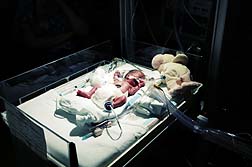 The study, conducted by Danish researchers, showed that babies born to women who take the SSRIs during pregnancy have a slightly increased risk for a specific heart defect. However, the study also found that the risk is highest when the mother-to-be takes either more than one SSRI during pregnancy or switches SSRIs early in the pregnancy, causing the fetus to be exposed to more than one SSRI.
The study, conducted by Danish researchers, showed that babies born to women who take the SSRIs during pregnancy have a slightly increased risk for a specific heart defect. However, the study also found that the risk is highest when the mother-to-be takes either more than one SSRI during pregnancy or switches SSRIs early in the pregnancy, causing the fetus to be exposed to more than one SSRI.Although the study found the overall risk for congenital heart problems caused by exposure to SSRIs while in the womb to be small, babies who were exposed to more than one SSRI while in the womb had a fourfold increase in septal heart defects. Septal heart defects are malformations of the wall that divides the left and right sides of the heart.
More SSRI Studies Needed
Researchers found that the use of Celexa and Zoloft early in pregnancy was linked to a small increased risk of a septal heart defect. This association was not seen in women who took only Paxil or Prozac.
The study, published in BMJ Online First (September 23, 2009) compared the incidence of birth defects among babies born to women who did and did not take SSRIs during the first trimester of pregnancy. Researchers defined the exposure window as being from 28 days before gestation to 112 days after the beginning of gestation. According to the study, the septal heart defects occurred in 0.5 percent of children who were not exposed to SSRIs in the womb, 0.9 percent of children who were and 2.1 percent of children who were exposed to more than one type of SSRI.
READ MORE SSRI LEGAL NEWS
In August, 2009, a joint statement was released by the American College of Obstetricians and Gynecologists (ACOG) and the American Psychiatric Association (APA), issuing guidelines for the treatment of depression during pregnancy. Those guidelines included gradually reducing or stopping medications altogether for women with mild depression who have had few symptoms for six months or longer; using psychotherapy or other treatments as alternatives to medication for some women with depression; and continuing medication with women who experience psychotic episodes, have bipolar disorder or are suicidal.
